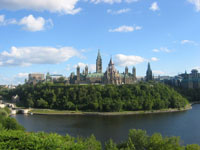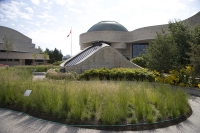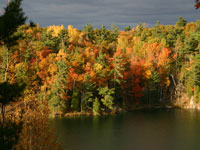Ottawa Travel Guide
The country's capital sits on the south bank of the Ottawa River, opposite the French-speaking city of Gatineau in neighbouring Quebec province. It's location on the border puts it in the unique position of being truly multicultural and bilingual, with a harmonious blend of French and English culture.
Ottawa was a humble lumber town until Queen Victoria designated it the capital of Canada in 1857. Since then it has grown into a modern and cosmopolitan city, often overlooked in favour of its larger, more glamorous neighbours, Toronto and Montreal.
Its main landmark is the 302ft (92m) high Peace Tower, rising above the imposing Parliament Buildings, which stand in Gothic splendour at the junction of the Ottawa, Rideau and Gatineau rivers.
The city has a network of waterways and canals that link it to Lake Ontario and Georgian Bay. Locals and visitors use the historic Rideau Canal for boating in summer, and for ice sculpting and skating in winter. The parliament buildings and other sites have an old-world European charm, offering numerous top-class museums and galleries, while the National Arts Centre houses an opera company, theatres, studios and restaurants.
Things to do in Ottawa
Ottawa is a green city, packed with parks and open spaces. As the capital of Canada, it sports numerous national attractions and top museums. A holiday in Ottawa is inevitably a busy whirl of sightseeing, but the city also has a jam-packed events calendar, so it is wise to check what's on when planning to visit. Fun festivals take place throughout the year, from ice-carving in winter to exploring tulip gardens in the spring.
While everyone will enjoy its charms, the city is particularly well suited to more active holidaymakers who'd enjoy cycling along the city's miles of trails, or ice-skating down the Rideau Canal in winter. Extreme outdoor activities such as bungee jumping and white-water rafting are also on offer just outside Ottawa.
Top attractions include the National Gallery of Canada, and Parliament Hill, the seat of Canada's federal government and site of frequent pomp and ceremony. Visitors should also stop at the Canadian War Museum, the UNESCO-listed Rideau Canal and the ByWard Market, a historic farmers' market by day and popular entertainment venue by night. If visitors want to go on a tour of Ottawa, a novel way would be to do so on the open-topped tourist buses.

Parliament Hill
Parliament Hill is a grandiose complex where visitors can embark on tours, observe parliament in action and experience ceremonial spectacles such as the Changing of the Guard. Its centre block houses the Senate and Commons chambers, with its distinctive Peace Tower a perfect vantage point for vistas of the capital. The historic east block contains restored offices of Canada's first prime minister and other early statesmen, while the west block houses the offices of parliament members and is closed to the public.

Canadian Museum of History
The Canadian Museum of History was created to enhance the country's understanding of its own past, with tremendously fascinating exhibitions focusing on Canadian history, world history and civilisation. Visitors arriving with kids may want to check out the Canadian Children's Museum too. It offers a child-friendly experience by including games, toys, costumes and hands-on props. The museum also has a 500-seat theatre, and a 295-seat cinema equipped with a giant 3D screen. All told, the combination of attractions should keep the entire family happy for hours on end.

Gatineau Park
Located just 15 minutes from downtown Ottawa, Gatineau Park is the capital's conservation and outdoor-recreation haven. Travellers can expect a fun itinerary of activities, regardless of the season. Swimming, hiking, biking, camping, cross-country skiing and snowshoeing are all on offer within an area renowned for its hilly woodlands and clear lakes. Visitors typically enjoy exploring the beautiful Luskville Falls, the diversity of forests along the King Mountain Trail, and the marble and geological phenomenon of Lusk Cave.
Getting Around
For sightseeing purposes, most visitors enjoy exploring Ottawa's compact downtown area on foot or by bicycle, but the OC Transpo company also provides a top-class integrated public transport system. Travellers can purchase tickets when boarding buses and streetcars, while day passes and discount tokens are available. Taxis are available but are fairly expensive. Rates should be displayed in the taxi cab and the meter rate should be set at one at the start of a journey. There are also ride-sharing apps such as Uber on offer.
Ottawa Climate and Weather
Ottawa's humid semi-continental climate boasts a vast range of temperatures between summer and winter. Essentially, the city has unpredictable weather conditions. Winters are generally snowy and icy. Average low temperatures in winter (December to February) can drop to 5°F (-15°C) at night. However, averages are misleading because days can be much warmer or colder. Ice storms can occur. Summer (June to August) in Ottawa is warm and humid, with temperatures exceeding 80°F (27°C) fairly often, sometimes as early as April and as late as October. Summers are usually short, though, while spring and autumn are unpredictable, with potentially early or late snowfalls, or unseasonal heat waves.
Canada travel info
Electricity
Electrical current is 120 volts, 60Hz. American-style flat two-pin plugs and a plug with a third round grounding pin are standard.
Language
The official languages are English and French (spoken predominantly in Quebec).
Money
The currency used is the Canadian dollar (CAD). Banks and bureaux de change will change cash, as will some hotels. Major credit cards are widely accepted and ATMs are widespread. US dollars are widely accepted.
Tipping
A tip of around 15 percent is standard in restaurants, and hairdressers and taxi drivers are usually tipped at the same rate. Bellhops, doormen, porters, and similar service providers at hotels, airports, and stations are generally paid at the customer's discretion.
Health
Travellers should be up to date with your COVID-19 vaccines before traveling to Canada, and should consider taking routine vaccines as a standard precaution. Medical care is excellent but expensive, so medical insurance is advised.
Safety
While most visits to Canada are trouble-free, the country does share the common international risk of terrorism. The crime rate is low but travellers are advised to take sensible precautions to safeguard their belongings, as they would anywhere. Parts of Canada are prone to tornadoes between May and September.
Local customs
Rowdiness and loud speech are inappropriate except under special circumstances or in places such as bars, as Canadians tend to be soft spoken, patient and almost apologetic in their public behaviour. They are generally tolerant of the complex network of cultural differences in public behaviour, particularly in cities where such diversity is more common place. Recreational cannabis is legally available throughout Canada, though local laws can vary depending on the province or territory travellers are visiting.
Doing business
Vancouver, Toronto, Calgary, and Montreal are the main business centres, and English is the language of business except in French-speaking Quebec, where all written material and business cards should be in French. Business cards are not traditionally exchanged during an initial meeting, but at some appropriate time thereafter; it is best to wait for the host to offer theirs first.
A firm handshake is used by way of greeting and punctuality should be taken seriously for meetings. Canadians dress conservatively and smartly for business and suits are the norm. Gifts can be given in conclusion to celebrate a deal, but should be understated; taking someone out for a meal is a popular way to conclude business dealings.
Canadians are reserved and frown on emotional outbursts. Business is based on facts and figures rather than relationships, so it is best to be as prepared as possible for meetings. Hours of business are usually 9am to 5pm, Monday to Friday.
Duty free
Travellers to Canada are allowed to enter the country with the following items without incurring custom duties: gifts to the value of C$60 per recipient (excluding advertising material, tobacco and alcoholic beverages); 200 cigarettes, 50 cigars or cigarillos and 200g of tobacco or 200 tobacco sticks; 1.14 litres of liquor or wine or 24 x 355ml bottles or cans of beer or ale. There are strict regulations governing the import of the following: explosives, endangered animal and plant species, items of heritage, fresh foodstuffs and weapons.
Communications
The international access code for Canada is +1. The outgoing code is 011 followed by the relevant country code. The outgoing code is not necessary for calls to the US and the Caribbean. Hotels, cafes and restaurants offering free WiFi are widely available. As international roaming costs can be high, purchasing a local prepaid SIM card can be a cheaper option.
Passport & Visa
All visitors must hold a valid passport, and it's recommended that passports always be valid for six months after the intended period of travel. Visitors are required to hold onward or return tickets, all documents needed for the next destination and sufficient funds to cover the period of intended stay.
Travellers from most visa-exempt countries arriving in Canada by air need to fill in an Electronic Travel Authorisation (eTA) form online prior to visiting Canada. This requirement is applicable to all but U.S citizens and travellers with a valid Canadian visa. Canadian citizens, including dual citizens, and Canadian permanent residents cannot apply for an eTA. As part of the Western Hemisphere Travel Initiative (WHTI), all travellers travelling between the United States and Canada, Mexico, Bermuda, and the Caribbean region are required to present a passport or other valid travel documents to enter or re-enter the United States. If departing from the USA a valid passport will be required by immigration authorities.
Entry requirements
US travellers should have a valid passport if departing from the USA. Other proof of citizenship is accepted in the form of a birth certificate, a US certificate of citizenship, a US certificate of naturalisation, or a NEXUS card. A visa is not required for a stay of up to six months.
UK nationals must have a passport valid for the period of intended stay. A visa is not required for a stay of up to six months, though UK travellers must have Electronic Travel Authorisation (eTA).
Australians must hold passports valid for period of intended stay. Nationals of Australia with an Electronic Travel Authorisation (eTA) are visa exempt for a maximum stay of 6 months.
South African nationals must be in possession of a passport valid for the period of intended stay. A visa is required. South African temporary passports are not recognised. Passports, identity or travel documents of Bophuthatswana, Ciskei, Transkei and Venda are not accepted.
Irish nationals must hold a passport valid for the period of intended stay. A visa is not required for stays of up to six months. However, the individual must have an Electronic Travel Authorisation (eTA).
New Zealanders require a passport valid for the period of the intended stay. No visa is required for stays of up to 6 months. However, the traveller requires an Electronic Travel Authorisation (eTA).
Useful contacts
Canadian Tourism Commission, Vancouver: +1 604 638 8300 or www.travelcanada.ca
911 (all emergencies)Embassies / consulates in other countries
Canadian Embassy, Washington DC, United States: +1 202 682 1740.
Canadian High Commission, London, United Kingdom: +44 (0)20 7258 6600.
Canadian High Commission, Canberra, Australia: +61 (0)2 6270-4000.
Canadian High Commission, Pretoria, South Africa: +27 (0)12 422 3000.
Canadian Embassy, Dublin, Ireland: +353 (0)1 234 4000.
Canadian High Commission, Wellington, New Zealand: +64 (0)4 473 9577.
Embassies / consulates in Canada
United States Embassy, Ottawa: +1 613 688 5335.
British High Commission, Ottawa: +1 613 237 1530.
Australian High Commission, Ottawa: +1 613 236 0841.
South African High Commission, Ottawa: +1 613 744 0330.
Irish Embassy, Ottawa: +1 613 233 6281.
New Zealand High Commission, Ottawa: +1 613 238 5991.



